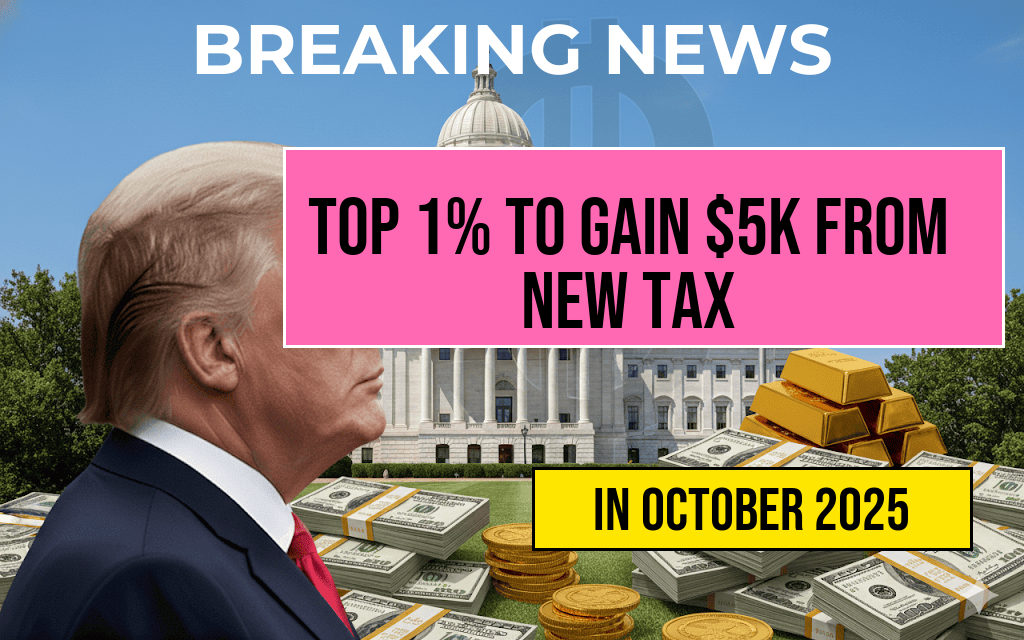The nation’s wealthiest Americans are poised to see an average increase of approximately $5,000 in their net income following recent tax policy adjustments enacted by Congress. This shift, driven primarily by changes to income brackets, capital gains taxes, and deductions, is expected to disproportionately benefit the top 1%—a group already holding a significant share of national wealth. While the specifics of the new legislation aim to balance fiscal responsibility with economic growth, critics argue that the financial gains for the highest earners could exacerbate income inequality, raising questions about the long-term impacts on economic mobility and federal revenue streams.
Details of the Tax Changes and Their Impact on Wealthiest Americans
Overview of the Policy Adjustments
- Adjustment of income tax brackets to prevent bracket creep due to inflation.
- Changes to capital gains tax rates, with some increases for high-income households.
- Enhanced deductions and credits targeted at specific investment and income scenarios.
- Revisions to estate and gift taxes, potentially affecting intergenerational wealth transfer.
Estimated Financial Gains
According to recent analyses by the Brookings Institution, the average net income increase among the top 1% will be around $5,000. This figure accounts for the combined effects of lower marginal tax rates on certain income brackets and strategic benefits from deductions and credits. Notably, this gain does not uniformly apply across all high-net-worth individuals but tends to favor those with substantial holdings in capital assets and investment income.
Breakdown of Income Sources Affected
| Income Source | Pre-Tax Share | Post-Tax Impact |
|---|---|---|
| Wage and Salary | 30% | Minimal change; tax brackets adjusted for inflation |
| Capital Gains and Dividends | 50% | Potential increase in net after-tax income due to rate adjustments |
| Business Income | 10% | Moderate benefit, depending on business structure and deductions |
| Inheritance and Estate Transfers | 10% | Changes could lower or raise tax liabilities depending on estate size |
Broader Economic Implications
Wealth Concentration and Income Inequality
Experts warn that the financial advantages conferred by the new tax regime may reinforce existing disparities in wealth distribution. The income gap between the top earners and middle or lower-income households could widen if the benefits predominantly favor those with significant investment portfolios. Critics argue that such policies risk creating an economic environment where wealth accumulation becomes even more concentrated among a small elite, potentially stifling broader economic mobility.
Federal Revenue and Public Spending
While the legislation aims to generate additional revenue through closing tax loopholes and adjusting rates, estimates suggest that the net effect on federal coffers may be modest. The Congressional Budget Office projects that these changes could add several billion dollars annually, which might be allocated toward deficit reduction or targeted social programs. Nonetheless, the impact on overall fiscal balance remains a subject of debate among policymakers and economists.
Public Response and Political Perspective
Support from Business and Financial Sectors
Advocates for the legislation contend that providing tax relief to high-income households stimulates investment and economic activity. “Encouraging investment among the wealthy can lead to job creation and innovation,” stated a spokesperson from the Forbes Council. Many argue that a thriving upper class fuels broader economic growth, which ultimately benefits society at large.
Opposition and Calls for Fairer Policies
Conversely, critics emphasize the moral and economic necessity of progressive taxation that prioritizes funding social programs and reducing inequality. Leaders from various advocacy groups argue that the gains for the wealthiest exacerbate disparities and undermine efforts to ensure economic justice. They urge policymakers to consider more equitable tax reforms that target wealth accumulation at the top, including higher estate taxes and closing loopholes exploited by the ultra-rich.
Looking Ahead
The expected net income increase of approximately $5,000 for the wealthiest Americans represents a significant shift in the tax landscape. As debates continue over the fairness and long-term effects of these policies, the focus remains on balancing economic growth with social equity. For high-net-worth individuals, the changes may translate into tangible financial benefits, but broader societal implications warrant ongoing scrutiny by policymakers and the public alike. The evolving tax framework underscores the ongoing challenge of designing fiscal policies that support a resilient and inclusive economy.
Frequently Asked Questions
What is the main impact of the new tax changes on the wealthiest Americans?
The wealthiest Americans in the top 1% are expected to see an average net income increase of $5,000 due to the recent tax reforms.
How will the tax changes affect overall net income for the top 1%?
The new tax policies are projected to result in a net income boost of approximately $5,000 for the wealthiest Americans in the top 1%.
Are there specific tax provisions that benefit the top 1%?
Yes, the tax changes include provisions that reduce tax burdens for high-income earners, leading to the income gains observed among the top 1%.
What is the significance of these income gains for the economy?
The increase in net income for the wealthiest Americans may influence investment patterns and economic growth, but it also raises discussions about income inequality.
When do these tax changes take effect?
The tax reforms are designed to be implemented starting in the current fiscal year, with the expected income gains for the top 1% occurring shortly thereafter.

Leave a Reply